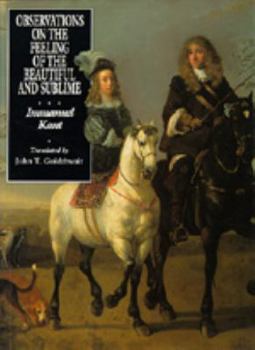Beobachtungen über das Gefühl des Schönen und Erhabenen
Select Format
Select Condition 
Book Overview
Beobachtungen ber das Gef hl des Sch nen und Erhabenen von Immanuel Kant.Immanuel Kant (* 22. April 1724 in K nigsberg, Preu en; + 12. Februar 1804 ebenda) war ein deutscher Philosoph der Aufkl rung.... This description may be from another edition of this product.
Format:Paperback
Language:English
ISBN:0520074041
ISBN13:9780520074040
Release Date:April 1991
Publisher:University of California Press
Length:126 Pages
Weight:0.35 lbs.
Dimensions:0.5" x 5.3" x 7.3"
Customer Reviews
1 rating
Kant's argument for finding the universal concept of beauty
Published by Thriftbooks.com User , 16 years ago
I read this book for a graduate seminar on the philosophy of art. Kant is one of the major figures in expression theory. What we understand as aesthetics changed only recently. Kant lays this out well in his "Critique of Judgment," which is one of his easier books to comprehend! Science and math development was momentous in re-interpreting how nature is understood, and all this starts in his time. The modern science narrative that says ancient thought erred; caused a split between science and philosophy. Scientific method and math causes nature to be seen in a "mechanistic" way, there are no "value" judgments anymore so this valueless nature by science caused the split because nature can't explain values anymore. Thus, philosophy finds that "values" are in humans, not in nature, we are the "location" of values now. Beauty, which is a value, is an idea in our minds. This expression theory says something about us it is in our minds. Kant agrees with this notion of how modern science operates especially in "Critique of Pure Reason." However, with questions of art he doesn't rely on science. Kant begins that there is such a thing as an experience of beauty, and that we normally presuppose that it must be compelling rather than just mere opinion unlike taste in food. Then he asks why would there be such a thing? He is now trying to lay out possible answers to that question. In the experience of beauty, the mind gets a special perspective on its own powers. Thus, this special perspective is free of the normal constraints of the things we do in our lives like knowing and worrying. Kant realizes that the aesthetic experience is subjective; it is in the human mind not in reality. He wants to make artistic judgments. Not just interested in individual subjectivity, he looks for a "universal" character of experience of judgment. It is not real useful to just catalogue people's subjective opinions. Kant says inter-subjective principle is part of the human mind as more of a collective. Thus, humans can make judgment. Kant's idea of taste is not to merely have a subjective opinion; people have a kind of competency they have discernment. The difficulty in this notion is, how does one know when they find a universal. Kant astutely argues that one can't argue towards an aesthetic judgment like in logic, aesthetics is subjective but he wants humans to be able to say; "this painting is beautiful, and not just to me." Important point: is there such a thing as subjective universality? This is his dilemma, although he thinks there is if you can use the principle of "disinterest." The realm of subjectivity is realm of interests. Once one is divorced of all normal interest, one can view art with a "disinterested" view. This notion of disinterest screens out allot but has to be connected to pleasure but not mere opinion universally. The other important element of disinterest has been the continuing idea and even could be something that co





